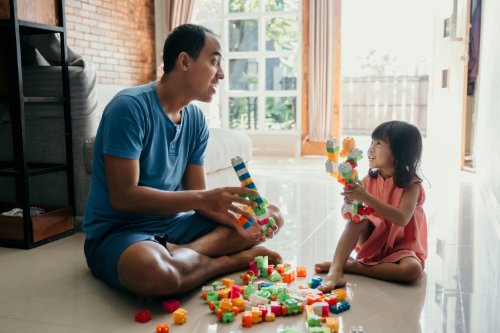4 Ways to Get the Most Out of Your Child’s Early Intervention
January 23, 2026
What happens when the parent is on the sidelines during their child’s early intervention sessions? Research shows that parent involvement makes a powerful difference. This article explores parents’ real experiences and shares four practical ways that parents can get more involved in their children’s early intervention.
Making Predictions with Thelma the Unicorn
November 13, 2025
Discover how to encourage fun conversations that help children build their understanding of a story with Thelma the Unicorn! This month’s Book Nook explores how making predictions helps children connect clues from words and pictures with what they already know, leading to a deeper understanding of what happens in the story.
School Readiness Tip: Keep the Conversation Going
November 12, 2025
When children participate in interactions that go back-and-forth many times, they have more opportunities to hear and practice language. Children learn the most from talking about their ideas, so let the child take the first turn to start an interesting conversation. Then, follow the child’s lead to keep the interaction going! Here are some fun ways to build back-and-forth conversations.
Six Things Children Enjoy Most in Interactions
November 05, 2025
Ever wonder what your child hopes you do more often? Find out six things you can do to support your child’s communication development and make the most of your interactions using Hanen strategies.
Highlight Your Language
October 30, 2025
As a parent of a young child who is having difficulty understanding and using words, you want to know what you can do to help. Highlight Your Language is a strategy you can use to help your child understand and use words by making the important words stand out! Think of this like using a highlighter pen, which makes the important words on a page stand out. When you highlight your language it’s not just what you say that matters, but how you say it!
School Readiness Tip: Follow the Child’s Lead in Conversations
October 27, 2025
Following the child’s lead means letting the child start the conversation and responding with genuine interest to what they say and do. This helps create more meaningful back-and-forth interactions, which are key to building strong language skills. Here are some fun things to try throughout the day.
Speaking More Than One Language with My Child
October 20, 2025
Many parents wonder whether they should speak more than one language with their child, especially if their child has difficulty communicating. This article answers common questions about bilingualism, such as whether it causes language delays, and provides ideas on how to support your bilingual child at home.
Incorporating Pretend with George Shrinks
October 17, 2025
When story time becomes play time, learning deepens!
In this month’s Book Nook, George Shrinks by William Joyce inspires children to imagine what it’s like to be small in a big world. Acting out parts of the story helps them build vocabulary, explore feelings, and understand story structure in a fun, meaningful way.
Discover how pretending with George Shrinks can boost comprehension and creativity
School Readiness Tip: Find Times to Talk Throughout the Day
September 12, 2025
The best way to build a child’s language is to have back and forth conversations about what interests them. Children who have more conversations about their ideas and interests develop stronger language skills and do better at school. Try these fun ideas to get started.






